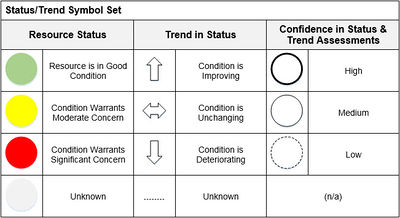Difference between revisions of "2017 Knowledge Assessment"
Cellsworth (Talk | contribs) |
Cellsworth (Talk | contribs) |
||
| Line 92: | Line 92: | ||
|style="color:#000;"| | |style="color:#000;"| | ||
| + | *[[Media:GCDAMP 2017 KA Recreational Experience Drivers & Constraints FINAL 2017-04-05.pdf| Recreational Experience Drivers & Constraints]] | ||
| + | *[[Media:GCDAMP 2017 KA Recreational Experience LTEMP Actions FINAL 2017-04-05.pdf| Recreational Experience LTEMP Actions]] | ||
| + | *[[Media:GCDAMP 2017 KA Recreational Experience Status & Trend FINAL 2017-04-05.pdf| Recreational Experience Status & Trend]] | ||
| + | *[[Media:GCDAMP 2017 KA Riparian Vegetation Drivers & Constraints FINAL 2017-04-05.pdf| Vegetation Drivers & Constraints]] | ||
| + | *[[Media:GCDAMP 2017 KA Riparian Vegetation LTEMP Actions FINAL 2017-04-05.pdf| Vegetation LTEMP Actions]] | ||
| + | *[[Media:GCDAMP 2017 KA Riparian Vegetation Status & Trend FINAL 2017-04-05.pdf| Vegetation Status & Trend]] | ||
| + | |||
| + | *[[Media:GCDAMP 2017 KA Sediment Drivers & Constraints FINAL 2017-04-05.pdf| Sediment Drivers & Constraints]] | ||
| + | *[[Media:GCDAMP 2017 KA Sediment LTEMP Actions FINAL 2017-04-05.pdf| Sediment LTEMP Actions]] | ||
| + | *[[Media:GCDAMP 2017 KA Sediment Status & Trend FINAL 2017-04-05.pdf| Sediment Status & Trend]] | ||
| + | |||
| + | *[[Media:GCDAMP 2017 KA Water Quality Drivers & Constraints FINAL 2017-04-05.pdf| Water Quality Drivers & Constraints]] | ||
| + | *[[Media:GCDAMP 2017 KA Water Quality LTEMP Actions FINAL 2017-04-05.pdf| Water Quality LTEMP Actions]] | ||
| + | *[[Media:GCDAMP 2017 KA Water Quality Status & Trend FINAL 2017-04-05.pdf| Water Quality Status & Trend]] | ||
|- | |- | ||
Revision as of 14:37, 5 April 2017
|
|
2017 Knowledge AssessmentKnowledge assessments are a standard tool in adaptive management, with two purposes: (1) They assess the state of knowledge concerning:
(2) They identify areas of uncertainty in this knowledge that the adaptive management team may want to address through additional investigations, including but not limited to field monitoring or research. The present (FY 2017) knowledge assessment is timed to coincide with and inform the Annual Reporting process and development of the next GCDAMP Triennial Work Plan for FY 2018-2020. This knowledge assessment is testing a methodology for better organizing, displaying, and communicating its findings, potentially to carry forward to guide future knowledge assessments as well. [1] |
| -- |
-- |
-- |
|---|
|
|
